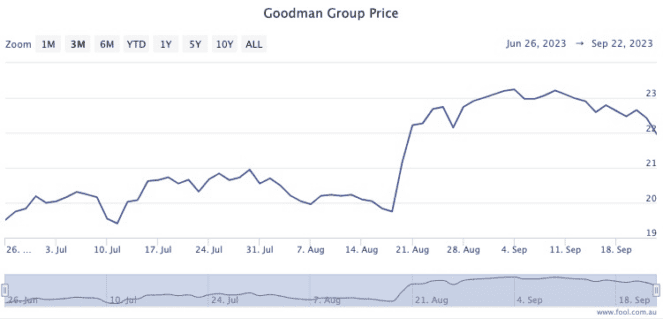As an industrial property manager linked to the fortunes of e-commerce, Goodman Group (ASX: GMG) has been a darling for investors for a few years now.
After all, the Goodman share price has more than doubled over the past half-decade.
However, the stock price has dropped a concerning 7.8% since the start of the month.

What's happening here? Is there something going on with the business you should know about before thinking about buying the dip?
Shaw and Partners portfolio manager James Gerrish had some thoughts:
'No detrimental announcements'
Firstly, Gerrish pointed out the share price dive hasn't been triggered from anything the company has communicated.
"There have been no detrimental announcements," he said in a Market Matters Q&A.
Rather, it is macroeconomic concerns bearing down on the industry.
"It's been influenced by weakness in the broader market," said Gerrish.
"Plus it has property exposure, and property stocks don't enjoy higher interest rates which can be shown through US bond yields. They ticked up during the week on the US Fed's comments."
Popular among professional investors
Considering this, one could argue it's a buy-the-dip opportunity for Goodman shares.
The industrial real estate manager is rated as a buy by 10 out of 12 managers currently surveyed on CMC Markets.
Nine of those reckon it's a strong buy.
Fairmont Equities managing director Michael Gable was certainly bullish on the stock in comments made earlier this month.
"Longer term it is likely to continue trending higher," he said.
"Balance sheet gearing (on a debt to total assets basis) as at 30 June 2023 was 8.3% and remains towards the bottom of the group's target range of 0% to 25%. Consistent with previous guidance, Goodman will aim to remain in the lower half of its target range."
This week the team at Morgans named the company as one of the best S&P/ASX 200 Index (ASX: XJO) shares to buy right now.
The analysts admitted Goodman never seems truly cheap in conventional terms.
"But within the context of its offshore peers, it consistently delivers higher returns at lower levels of leverage and at a comparable price to book ratio," their memo read.
"With continued increases in interest rates and persistent inflation (most notably construction costs), risks abound [in] the REIT sector. This drives our preference for beds and sheds, reflecting the strength of those underlying operating markets."








